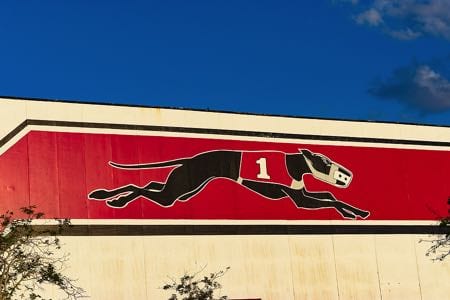
There has always been a close link between dog tracks and bookmakers, not least of all because that’s where many of the people who founded the modern day bookies that we all know by name began their careers. In more recent times, the Bookmakers’ Afternoon Greyhound Services have been hugely important to the success and even the survival of the industry, which gives you a sense of the link that still exists.
Such is the relationship between bookies and the dogs, a number of bookmakers have actually bought a dog track or racecourse over the years. They did so in order to both support the industry and to further the money that they could make from it. By owning a racecourse where greyhound racing took place, a bookie could keep out their rivals and have a monopoly on the bets that punters placed there.
The Bookies That Started Life at the Dogs
Many moons ago, when betting was far from the ever-present activity that it is nowadays, bookmakers were limited in how their operations could work. There weren’t any shops on the high street as there are today, nor was there the option to bet online. Indeed, personal computers and mobile phones were nothing but a distant pipe dream, meaning that bookies were limited in what they were allowed to do legally.
Though many of the companies that are all above board and kosher in the modern era of betting took bets on the streets illegally, a number of them also set themselves up as on-course bookmakers at the racecourses that were made for either horses or greyhounds. It was a way to get a licence to operate as a bookie and take money without breaking the law to do so. Here’s a look at some of them.
William Chandler
 The man responsible for creating the company that would go on to become BetVictor was born in Hoxton, London in 1880. It’s believed that he started an illegal bookmaking business in the 1920s, but he made a name for himself as a legal bookie at greyhound stadiums. The one that is most closely associated with him was White City Greyhounds, where he worked hard to become the leading bookmaker.
The man responsible for creating the company that would go on to become BetVictor was born in Hoxton, London in 1880. It’s believed that he started an illegal bookmaking business in the 1920s, but he made a name for himself as a legal bookie at greyhound stadiums. The one that is most closely associated with him was White City Greyhounds, where he worked hard to become the leading bookmaker.
Later, Chandler became both a shareholder and a director at Hackney Wick Greyhound Stadium, keeping hold of his shares in the place until the early part of the 1930s. At that point, he chose to sell his shares in it in order to buy Crooked Billet, an unlicensed greyhound track that was based in Walthamstow. He turned this straight, developing it into Walthamstow Stadium.
William Hill
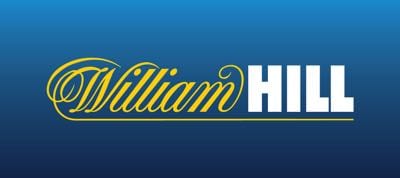 Perhaps no tale of the relationship between greyhound racing and betting is as explicit as that of the founder of the bookmaker that took his name, William Hill. Born in 1903, he began his working life on his uncle’s farm before leaving to work in a factory. Whilst there, he collect illegal bets from people in the local area before eventually joining the Royal Irish Constabulary becoming an underage driver.
Perhaps no tale of the relationship between greyhound racing and betting is as explicit as that of the founder of the bookmaker that took his name, William Hill. Born in 1903, he began his working life on his uncle’s farm before leaving to work in a factory. Whilst there, he collect illegal bets from people in the local area before eventually joining the Royal Irish Constabulary becoming an underage driver.
When he left the RIC and returned to London in 1929, he began to take bets on greyhound racing. This gave him enough money to open an illicit gambling den in 1934, which was located in Jermyn Street. He was able to exploit a loophole in the law to keep it legal, but all references to his slightly dodgy past have been erased from his company’s official history. A suggestion, perhaps, that bookies don’t want to own up to the manner in which the greyhounds helped get them started.
Joe Coral
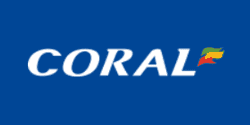 Born Joseph Kagarlitski, Joe Coral was the founder of the bookmaking firm that would go on to become Coral. Whilst he was predominantly interested in betting pitches at horse racecourses during the formative years of his time as a bookie, he went on to open pitches at numerous different greyhound stadiums around London. Initially, he had one at Harringay Stadium, then opened another at White City.
Born Joseph Kagarlitski, Joe Coral was the founder of the bookmaking firm that would go on to become Coral. Whilst he was predominantly interested in betting pitches at horse racecourses during the formative years of his time as a bookie, he went on to open pitches at numerous different greyhound stadiums around London. Initially, he had one at Harringay Stadium, then opened another at White City.
Clapton Stadium and Walthamstow Stadium were soon both added to his list, giving him a decent amount of working capital. It was the money that he made from his greyhound pitches that put him in an ideal situation to take advantage of the first licensed betting offices opening in 1961. Mergers and acquisitions would follow, but it was Joe Coral’s relationship with greyhound racing that started the ball rolling.
Bookies & the Dogs
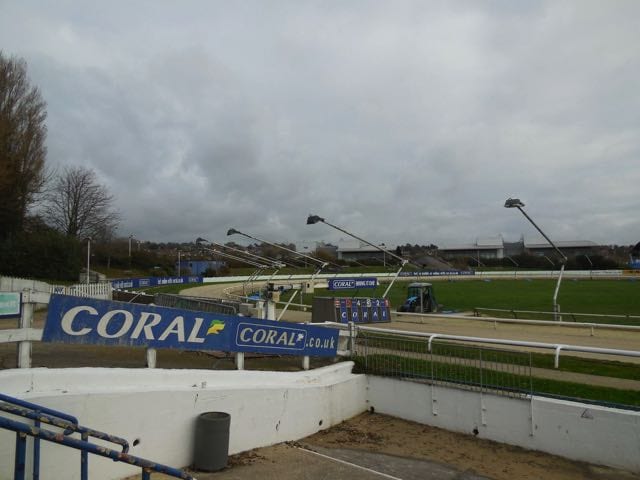
Whilst specific bookmakers were able to make a name for themselves by having pitches at greyhound stadiums, the reality is that the relationship between the sport and the betting industry goes much deeper than that. In an open letter written in 2018, the Chairman of the Association of British Bookmakers, Paul Darling, made a reference to exactly this point when essentially begging the industry for help.
In his letter, Darling wrote, “Greyhound Racing relies heavily on the Bookmaking Industry to pay a contribution based, in our case, on a percentage of turnover of greyhound bets into the industry.” The contribution, he pointed out, was voluntary and not enough bookies were choosing to pay into it, which meant that the greyhound racing industry as a whole was in trouble as a result.
It’s not just the putting on of racing events that is affected by the lack of sufficient contributions to the levy by bookmakers. The money also contributes to the welfare of greyhounds and dropped by 50% in the mid 2010s on the decade prior, despite betting companies as a whole making as much as £237 million from greyhound racing in 2014 alone. It was a serious issue, which explained Darling’s begging letter.
Which Bookmakers Own Courses?
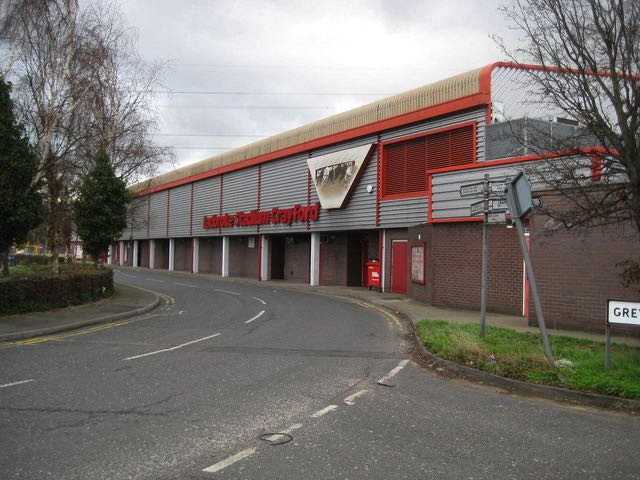
It was something of a standard thing for a bookmaker to have at least a share of a greyhound stadium at the start of the legalised betting industry, as shown in the cases of bookies such as William Chandler. Over the years, however, the world of greyhound racing has become less popular, with stadiums closing up and down the country. Rather than offering it support, the betting industry has as good as abandoned it.
It is with this in mind that we look at how many dog racecourses or tracks have an association with a bookmaker in the modern day and discover that it is not very many. Here’s a look at the 19 different greyhound stadiums that are still in operation in the United Kingdom, exploring where it is that they’re based and who it is that owns them. In some cases, the owners aren’t publicly known and so are assumed.
| Stadium | Location | Owner |
|---|---|---|
| Brighton and Hove Stadium | Brighton and Hove | Ladbrokes Coral |
| Central Park Stadium | Sittingbourne | Cearn Sports |
| Crayford Stadium | London | Ladbrokes Coral |
| Doncaster Stadium | Doncaster | Independent |
| Harlow Stadium | Harlow | Dave Barclay |
| Henlow Stadium | Stondon | Bob Morton |
| Kinsley Stadium | Kinsley | Independent |
| Monmore Green Stadium | Wolverhampton | Ladbrokes Coral |
| Newcastle Stadium | Newcastle-upon-Tyne | Arena Racing Company |
| Nottingham Stadium | Nottingham | Arena Racing Company |
| Owlerton Stadium | Sheffield | A & S Leisure Group |
| Pelaw Grange | Chester-le-Street | Jeff McKenna |
| Perry Barr Stadium | Birmingham | Arena Racing Company |
| Romford Stadium | London | Ladbrokes Coral |
| Shawfield Stadium | Shawfield | Shawfield Greyhound Racing and Leisure Company Ltd |
| Sunderland Stadium | Sunderland | Arena Racing Company |
| Swindon Stadium | Swindon | Stadia UK |
| Towcester Stadium | Towcester | Fermor Land LLP |
| Yarmouth Stadium | Great Yarmouth | Stephen Franklin |
It’s certainly interesting to note that the only bookmaker that still owns greyhound stadiums at the time of writing is Ladbrokes Coral, with the combined company owning four of the 19 venues on our list. That’s the equivalent of 21.05%, or roughly a fifth of all of the stadiums still in operation in the United Kingdom. Despite the numerous takeovers and mergers, perhaps there is still a link back to Joe Coral and his humble beginnings.
Stadiums That Bookies Used to Own
In the relatively recent past, bookmakers have owned more than just the four that are currently owned by Ladbrokes Coral. The ownership of stadiums is perhaps not quite as prolific as one might imagine, knowing the history of numerous bookmakers and the ties to the sport, but it’s still worth pointing them out and flagging up the fact that they were sold, even if the reasons for the sales aren’t explicitly known.
Birchfield Ladbroke Stadium
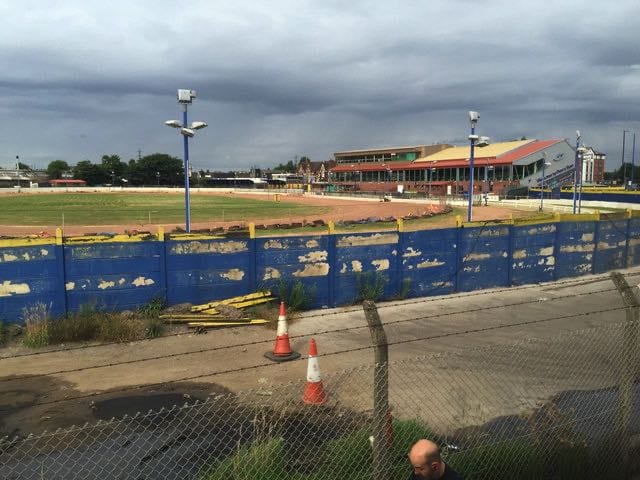
The name of this stadium gives away its former owner. Sometimes referred to as the old Perry Barr Stadium, the venue was located in the Birchfield area of Birmingham. It was the third greyhound track to open in the city, following on from Kings Heath Stadium and Hall Green Stadium. It opened on the 7th of April in 1928 and took on its bookmaker associate name when Ladbrokes bought it in 1976.
Investment in the facilities of the venue were high on the bookies’ list, with the company determined to prove themselves as good owners after missing out on both Romford Greyhound Stadium and Brighton & Hove Greyhound Stadium when Coral bought them both. The company sold the land to developers in the middle of the 1980s, with the last meeting taking place there on the 14th of April 1984.
Newcastle & Sunderland Greyhound Stadiums
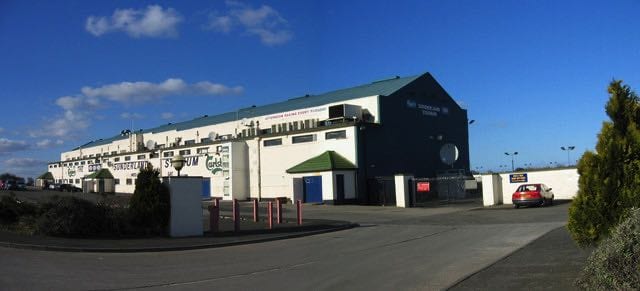
Whilst Geordies and Mackems would no doubt be furious at being lumped in together, the reason for doing so here is that the stadiums in those two cities were sold to Arena Racing Company at the same time by their former owner William Hill. That was in 2017, seeing the number of tracks owned by bookies fall by two as a result. Not that that was necessarily seen as a bad thing by the industry, given ARC’s relationship with it.
Newcastle Stadium was opened in 1928, coming just weeks after Tyneside Sports Stadium Limited had opened a track to the south of Scotswood Bridge, which they named White City Stadium. The Totalisators and Greyhound Holdings bought it in 1964, with the TGH itself being bought by Ladbrokes in 1974, meaning that the bookie also bought the stadium. They sold it in 1983, with William Hill buying it in 2003.
Sunderland Greyhound Stadium, meanwhile, didn’t open its doors until 1940 when £60,000 was spent on a design from architects Matkin and Hawkins. It soon gained an association with the National Greyhound Racing Club before spending 40 years as an independent track. William Hill’s decision to purchase the track pre-dated its choice to buy Sunderland, coming about in 2002 and hosting its annual ‘Festival of Racing’ there.